Is the U.S. in a "high-level equilibrium trap"?
When countries start fearing the future, they stagnate.
“I set no value on objects strange or ingenious” — The Qianlong Emperor
Ten years ago, when I was still writing freelance articles in my spare time, I wrote a post for The Week in which I mused about America becoming like China’s Ming Dynasty — powerful but insular, rich but stagnant, arrogantly disdainful of science and technology, and ignorant of progress being made in the world outside:
Ming China was by far the greatest nation on the planet for most of the 15th and 16th centuries…But with the hindsight of history, the Ming doesn't look so awesome. While China was basking in seemingly timeless stability, Europe was seething with new ideas and technological progress. Even as the Chinese government banned oceanic shipping and heavily restricted foreign trade, European countries were discovering the New World and building trading empires…Another likely reason for the Ming's decline was disrespect of science…[T]he Ming education system de-emphasized science and technical studies, and instead forced aspiring bureaucrats to learn "Confucianist" philosophy…
Why did the Ming allow itself to become isolationist, stagnant, and backward-looking? Historians are divided, but the leading explanation is what…Mark Elvin calls the "high-level equilibrium trap." Simply put, when a country thinks it's in a golden age, it stops focusing on progress…
America shows signs of falling into this trap…We gape and gawk when we first travel to Japan or Switzerland and find that all the trains run perfectly on time — not to mention the fact that there are trains in the first place. We ignore our sky-high infrastructure costs…never pausing to wonder why West Europe and East Asia don't have these problems…America had an extraordinary run of success in the 20th century…But other countries have been racing to catch up with us, and in some ways they have already succeeded.
At the time, this post was not particularly well-received. Experts on Chinese history scoffed at the analogy and told me to stay in my lane. The broader public simply yawned, seemingly secure in the belief that America would continue to be the world’s leading nation, as it had been for their entire lives.
I agree that sweeping historical analogies are overwrought and rarely useful, especially when they draw parallels between modern times and the agricultural age. To be honest, at the time, I wanted the post to be more of a warning than a prediction. I didn’t think the U.S. was well on its way to becoming the Ming dynasty, but I saw a few troubling signs of complacency and insularity, and I wanted Americans to be more proactive about fixing our country’s problems and pushing progress forward. We have a long and hallowed tradition of using declinist histrionics as a form of self-motivation.
These days, however, I often find myself thinking about that post, and it feels like the Ming analogy fits a bit better than it did in 2015. I thought about it again when I saw the results of a recent Ipsos poll, which asked countries around the world about their attitudes toward AI. Of all the countries surveyed, Americans were among the most negative toward the technology, and Chinese people were among the most positive:
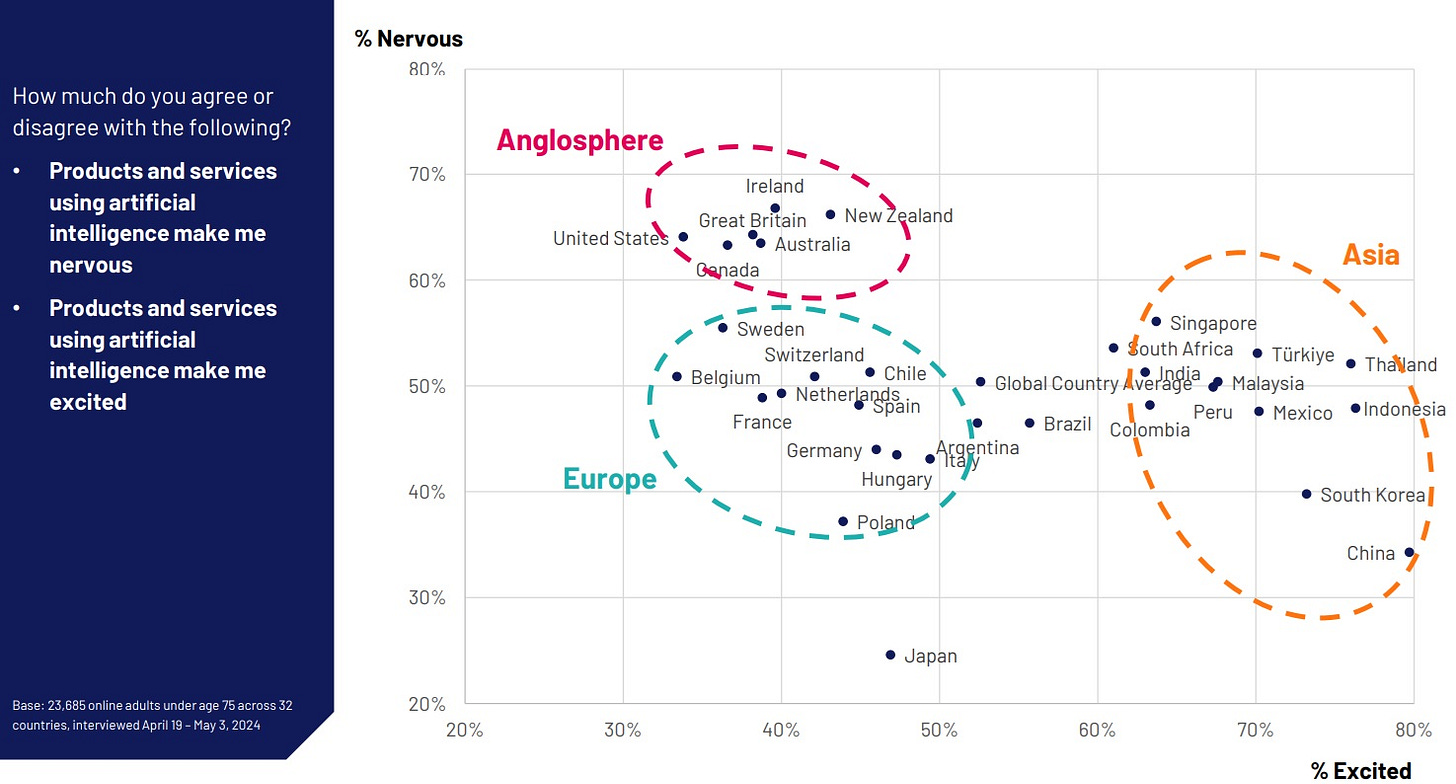
This survey closely parallels my own experience. When I hear other Americans talk about AI, it’s usually disapprovingly — many seem to think of AI as primarily something that threatens their jobs while producing little that they need or want. Over on X, I decided to see what would happen if I expressed bland, anodyne, positive sentiments about AI:
Here were some of the representative responses that I got:
It’s not just AI, though. Look at the two countries’ different approaches to nuclear power. Over the past decade, China has nearly tripled its nuclear capacity, while America’s has declined:

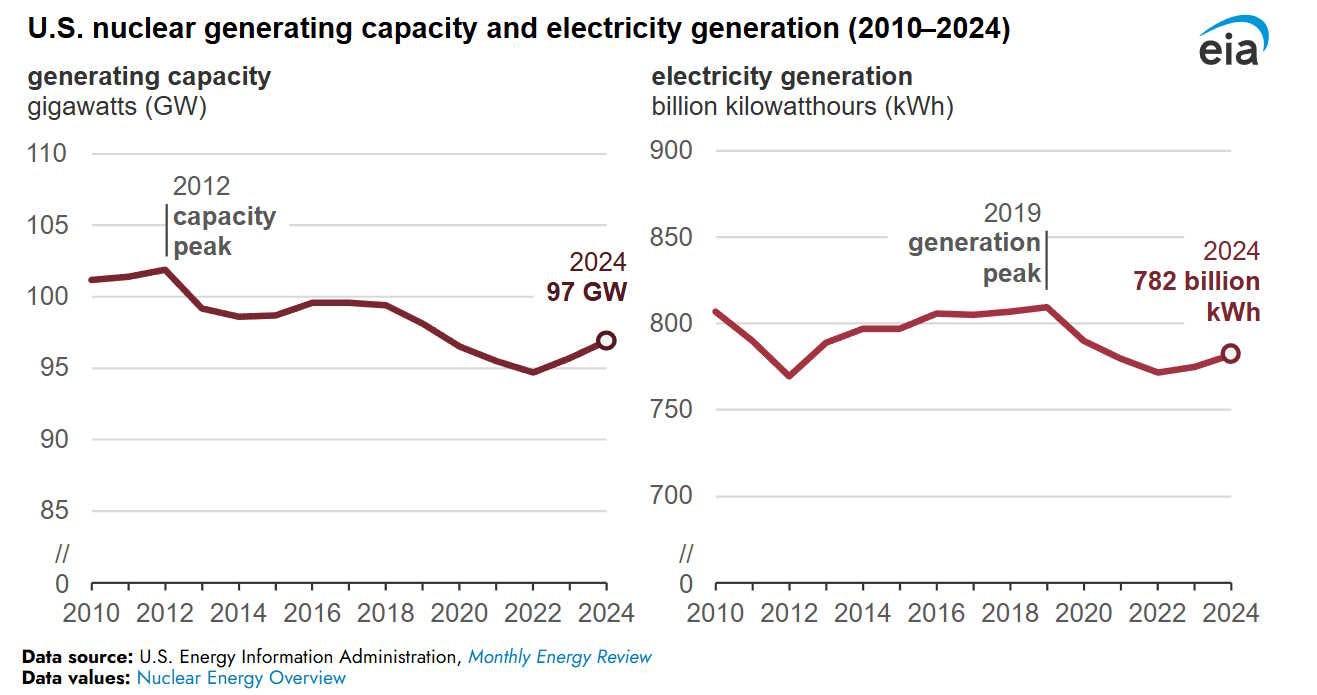
And this divergence is accelerating. China just approved 10 new nuclear plants, which will catapult it past the U.S. and France to be the world’s top country in nuclear energy. Meanwhile, in the U.S., the Republicans in the House of Representatives are poised to wreck the domestic nuclear industry. Thomas Hochman and Pavan Venkatakrishnan write:
Earlier this week, two House committees released their sections of the [budget] bill, which includes cuts to key energy loan and tax credit programs. If enacted, the provisions would constitute the biggest setback to U.S. energy security in a generation — and nuclear energy would be hardest hit…Nuclear projects face massive up-front capital costs…As a result, private lenders either charge prohibitive interest rates…This is why every commercial nuclear reactor to enter service since the turn of the century has relied on…the Department of Energy’s Loan Programs Office — save one, which was built with similar federal support via the Tennessee Valley Authority.
The Trump White House has previously recognized the importance of these loans…But the draft reconciliation language would wipe that progress away. By limiting both funding for administrative costs and virtually all unobligated credit subsidies…the bill could leave the office unable to pay staff or originate most new deals…Tax credits are on the chopping block, too…[the GOP bill] would also terminate transferability, the mechanism that lets a project developer sell its energy tax credits…Its elimination would kneecap next-generation projects just as they’re getting started.
I don’t think nuclear will be our most important energy technology over the next half century, but this is still a very bad sign.
Why do Americans fear the future while Chinese people embrace it?
Why are Americans so much more negative about AI and nuclear power than Chinese people? We’re always tempted to blame partisan ideology, and I admit that sometimes that is the root of the problem (mRNA vaccines). In general, there’s a recent pattern where Democrats fear the software industry while Republicans are apprehensive about new physical technologies.
But in these cases, I just don’t think that explanation fits. Nuclear power is traditionally thought of as being Republican-coded, and yet this time it’s Republicans who are now voting to gut it. And fear of AI is very bipartisan:
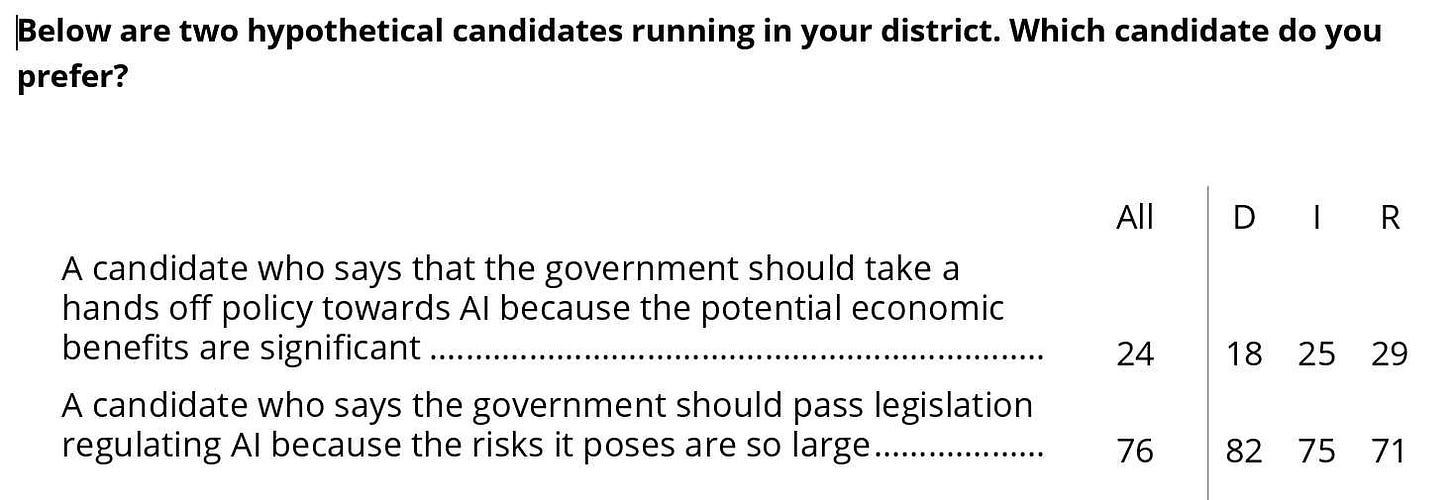
The most likely reason, I think, comes from the two countries’ recent histories. We know that people’s life experiences deeply shape their macroeconomic expectations; why should attitudes toward technology and progress be any different?
The U.S. has been a slow-growing country at the technological frontier for as long as almost all of us have been alive. If your country generally grows at 2%, you can expect to see your living standards quadruple over your lifetime. That’s much better than nothing, but it means that in the shorter term — over a five-year or ten-year period — your economic fortunes will be primarily determined by random shocks, not by the slow and steady march of technological improvement. A spell of unemployment, a medical bankruptcy, a decline in the price of your house, the loss of a government contract or a big customer — any of these could wipe out many years of slow improvement in living standards.
In other words, to most Americans, risks loom larger than opportunities. If everything stays the same, then they’ll continue to be wealthy and comfortable; if something changes, they might not. In an environment like that, it makes sense to be afraid of change, because change means risk.
For most of Americans’ lives, technological progress has been a major source of risk. The advent of the internet put encyclopedia salesmen and term life insurance salesmen out of a job. Hybrid cars from Japan put competitive pressure on traditional carmakers. Flip-phone makers were wiped out by smartphones. Electronic trading made many human “specialists” obsolete. And so on and so forth, throughout the economy. At the aggregate level, these innovations drove growth in living standards, but at an individual level, having the technology in your industry change was generally a source of peril.
Someone who grew up in modern China has experienced something utterly different. Over the course of their lifetime, rapid technological progress has radically transformed their lives and the lives of the people around them, allowing them to experience a level of comfort and security utterly undreamt of by their grandparents.
Meanwhile, the risks from new technology were pretty low. In a fast-growing economy, if your job gets automated, you can often just go get a better one. If your industry gets destroyed by competition from a new technology, you can often just go work for the winners, since everyone is just expanding business so quickly.
You can see this pattern in all sorts of polls. A decade ago, Pew did a survey and found that fast-growing countries tend to be much more optimistic about the future than slow-growing ones:
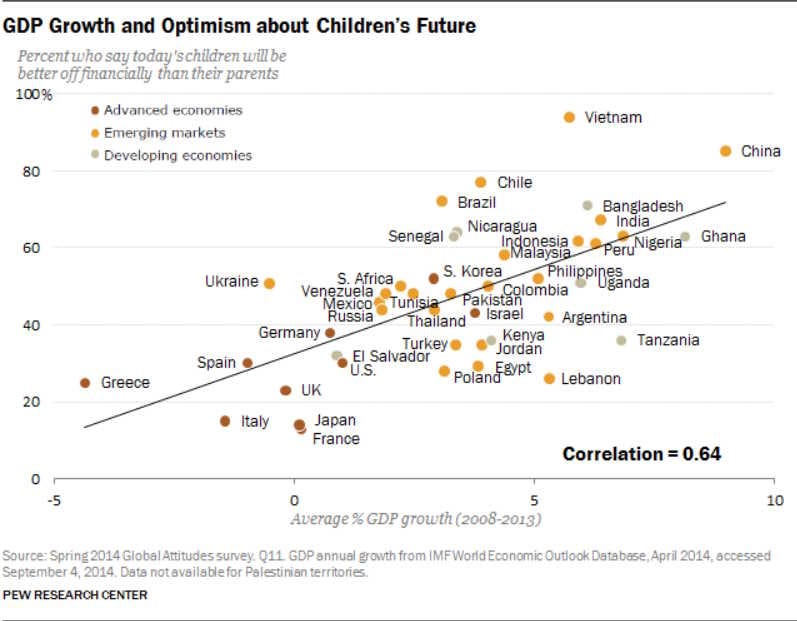
China’s once-torrid growth has now slowed, of course; it has caught up to the advanced economies technologically, and has less room to grow. In 30 years, as the young generation grows up in a world of slower growth,1 Chinese attitudes toward things like AI — or whatever the next cutting-edge thing is — may converge toward those of their rich-world peers.2 But 30 years is a long time, by modern standards — long enough to determine whether the U.S. or China will be the world’s premier civilization.
The example technologies I cited above — AI and nuclear — aren’t actually the best illustration of the divergence between a pessimistic, backward-looking America and an optimistic, forward-looking China. America invented AI, and has most of the world’s premier AI companies and researchers. Despite popular anxieties, both the government and large companies recognize the crucial importance of the technology, and are investing heavily to stay at the cutting edge. Meanwhile, the U.S. still has more nuclear power per capita than China, and that will continue to be true for a while. If we were just talking about AI and nuclear, then this post would be more of a warning than an alarm — much like my post about the Ming dynasty back in 2015.
But we’re not just talking about AI and nuclear. In fact, there’s a crucial set of technologies that has recently experienced revolutionary breakthroughs, and is poised to reorder global power and wealth over the next few decades. And when it comes to this set of technologies, the U.S. is moving backwards, while China has seized global leadership.
I’m talking, of course, about electrical technology.
America is losing the Electrical Age
Over the past few years, I’ve come to understand that the world is undergoing a profound technological shift — the kind of thing that only happens once a century, and perhaps only a few times in all of human history. I tried to explain it in this post:
During the 19th century, the Industrial Revolution was powered by combustion technology — you burned coal to boil water into steam, and steam turned a series of gears that powered trains, ships, and factories. In the 20th century, internal combustion gave us cars, planes, and rockets. But in the 20th century, we also harnessed an alternative method of generating power — electricity. When we needed fine control instead of raw oomph — for example, to power the parallel workstations of a modern factory, or to power a delicate device like a TV or a computer — we pushed electrons through wires instead of creating a controlled explosion.
Then, at the close of the 20th century and the beginning of the 21st, there were three key technological breakthroughs that changed the balance between combustion and electricity. These were:
Rare-earth permanent magnets
Gallium nitride and silicon carbide transistors
Lithium-ion batteries
In my experience, very few Americans know that the first and second of these breakthroughs even happened — or even what these technologies are. That in itself is shameful, and represents a failure of our education system. In brief:
Rare-earth permanent magnets are able to hold a much stronger magnetic field than traditional magnets like the toys you played with when you were a kid or the little magnets you stick on your refrigerator. You can use these super-powerful magnets to create electric motors with very high torque, to power cars, drones, or other stuff that could previously only be powered by combustion engines. These were developed in the 1980s and 1990s:
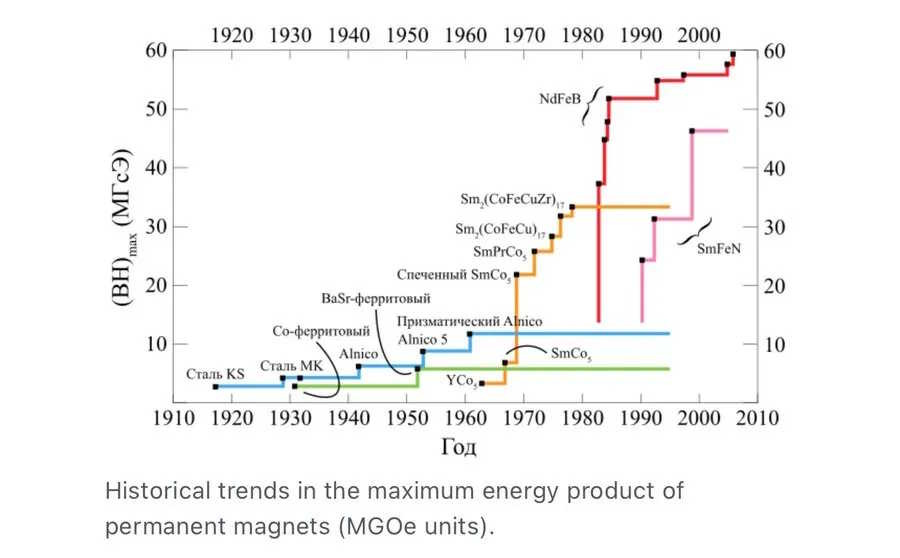
Source: Sam D’Amico GaN and SiC transistors are able to operate at much higher levels of current and voltage than the transistors that run your computer or your phone. This allows them to work in things like cars and drones that operate at very high power:
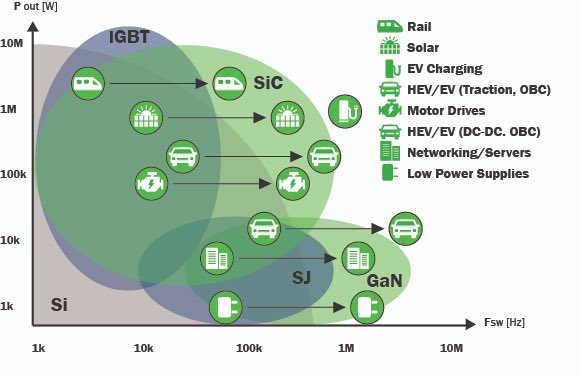
Source: Power Electronics News via Sam D’Amico They were developed in the 2000s and 2010s.
Lithium-ion batteries were developed in the late 20th century, and a series of incremental innovations led to a huge increase in the amount of energy they can hold, and a huge decrease in their manufacturing cost:

Source: RMI via Sam D’Amico
Together, these three inventions have made electricity better than combustion for a wide range of physical technologies. They’ve made electric cars better than combustion cars along almost every possible dimension — and even the few drawbacks that EVs still have, like slow charging, are being solved pretty easily by a series of more modest inventions. And they’ve made battery-powered drones the dominant weapon on the modern battlefield.
Increasingly, it’s electricity, not combustion, that rules the land and the sky.
Whichever country dominates electrical technology will therefore rule the land and the sky in the 21st century. AI is amazing, and yet without drones for it to command, it will not be able to win modern wars. And no matter how entertaining our online lives are, humans will still need to move themselves and their possessions around in physical space, so the auto industry will continue to be incredibly lucrative and important.
Currently, America is losing this race, in dramatic and catastrophic fashion. I wrote about this back in December:
While the U.S. lags behind Europe and the world overall in terms of the percent of its energy it gets from electricity, China has surged ahead of the field:
Meanwhile, China is now dominating the global auto industry because it’s embracing electric cars more than other countries are:

China also dominates the manufacturing of batteries, drones, and electric motors.
So while America is remaining competitive (for now) in software, and still has a lead in the old combustion technologies of the 20th century, China is absolutely trouncing us in the race for the new electrical technologies that will define physical power this century.
Given this dire situation, you’d think America would be racing to catch up. Instead, we’re intentionally forfeiting the race, destroying our nascent electrical capabilities as fast as we can:
President Donald Trump's 'Big, Beautiful Bill' spans 1,116 pages. Some of those pages include serious cuts to clean energy incentives in a number of sectors such as transportation…Section 112002 on page 30 of the One Big, Beautiful Bill document is titled "Termination of clean vehicle credit." The credit was originally set to expire December 21, 2032. A provision in the bill "accelerates the expiration to December 31, 2025." Americans would lose the ability to claim the EV tax credit in 2026…The bill also targets EV and hybrid vehicle owners…Electric vehicle owners could be charged $250 annually and hybrid owners could be charged $100 annually if the bill is passed…The President has been taking aim at EVs for years…The passage of the bill as is would mean electric vehicles are about to get much more expensive.
And:
House Republicans also propose to kill a loan program that supports the manufacture of certain advanced technology vehicles. It would rescind any unobligated funding and rescind corporate average fuel economy standards and greenhouse gas emission rules for 2027 and beyond. That portion will be taken up by the Energy and Commerce Committee.
Among outstanding loans finalized in President Joe Biden’s last weeks in office are $9.63 billion to a joint venture of Ford Motor and South Korean battery maker SK On for construction of three battery manufacturing plants in Tennessee and Kentucky; $7.54 billion to a joint venture of Chrysler-parent Stellantis and Samsung SDI for two EV lithium-ion battery plants in Indiana; and $6.57 billion to Rivian for a plant in Georgia to begin building smaller, less expensive EVs in 2028.
This is intentionally forfeiting the technological future to China. The auto industry is lucrative and important, but even that pales in comparison to the importance of drones. If you can’t build batteries and electric motors in the U.S., you can’t build drones here, either. And if you can’t build drones, you can’t win a modern war.
Defenders of Trump’s move to kill battery subsidies will ask: If batteries are the best technology, why do they need subsidies? The answer is so simple and so obvious that anyone who even asks the question should feel a deep sense of intellectual shame: Markets do not provide national defense. The battery and motor manufacturing capacity America needs in order to defend itself against China will simply not be sufficient without subsidies, since China is heavily subsidizing its own manufacturing capabilities in this area. Of course, as military ground vehicles go electric, the same will hold true for those as for drones.
Would you want China to make all of the world’s plutonium? No? Would you want China to make all of the world’s jet engines and rockets? No? Then you’re a fool to want to let China make all of the world’s batteries and electric motors.
I don’t want to get too partisan here. After all, it was NIMBY progressives who blocked many of the Biden administration’s attempts to build solar power and transmission lines, and it was progressive contracting requirements that stymied Biden’s attempt to build a network of EV chargers. Some progressives even hate electric cars, because they hate cars in general. This is all very foolish.
Among Republicans, however, and especially among followers of Trump, hatred of electrical technology has been raised almost to the level of a cultish religion. This is partly downstream of a tactical error by progressives, who sold their own base on the electric future by painting it as a climate policy instead of as a policy for promoting economic growth and national security. But that shouldn’t let conservatives off the hook here. At the end of the day, Democrats tried (inefficiently) to give electric technology a boost, and Republicans are the ones killing that effort.
Try talking to a conservative about the importance of EVs, and you’ll typically be confronted with a confused eruption of the most outdated arguments why the technology will never work. “EVs don’t have good range!” (False.) “EVs are slow to charge!” (False.) “Batteries can’t be recycled!” (False.) And so on, ad infinitum. It’s like hearing someone in 1910 tell you that cars will never replace horses, even as that replacement was well underway.
You simply cannot will a technological shift out of existence, or make the world go back to the way it used to be, no matter how big and powerful your country is. In 1793, a British mission to China (which was then ruled by the even more stagnant and isolationist Qing dynasty that succeeded the Ming) offered the emperor various technological marvels from the West. The emperor was unimpressed, and expressed utter disinterest in the wonders he was being shown, uttering the famous line: “As your Ambassador can see for himself, we possess all things. I set no value on objects strange or ingenious, and have no use for your country’s manufactures.”
Fast forward a couple of centuries, and the shoe is on the other foot. It’s America — the leading civilization of the West — that is turning up its nose at new inventions that are remaking the map of global power. We really are becoming a technophobic civilization, looking inward to our petty domestic conflicts and looking backward to our great historical achievements, even as a rival civilization embraces the future. My Ming dynasty analogy was more appropriate than I realized at the time.
In fact, the rule I’ve postulated — that people who grow up with faster growth are more optimistic — is far too simple. When growth slows down during a person’s lifetime, having grown up under rapid growth tends to make them structurally pessimistic, since it raises their expectations to unsustainable levels. Matsumoto et al. (2024) document this effect. This may happen with the current generation of young Chinese people.
This is actually why the Ming dynasty analogy is more rhetorical than real. In the industrial age, things like technology, economic growth rates, and demographics change much more quickly than they did back in the agricultural age. It took only two or three decades for Japanese people to go from optimism to pessimism about their country’s future, and China might end up being the same. Maybe as every country ages into senescence and catch-up growth runs its course all over the world, we’ll become a global Ming dynasty. Or perhaps AI will supercharge growth rates and we’ll figure out a solution to the low fertility problem, and optimism will be restored. Either way, the long slow decline of an agricultural society like the Ming seems less likely in the modern unstable age.












This raises a question for me: assuming that most people are averse to external shocks to their station in life, and assuming that all those people vote to select representatives that on average reflect their views, is democracy in some level going to be averse to technological change past a certain point?
Whats to stop a large number of people from trying to do some version of what the longshoremen pulled off if they figure out that’s what works to at least maintain stability?
Related to this, what should be done for those whose work is completely outmoded? Assuming new technologies do prove a threat, throwing large numbers of people into economic irrelevance does not seem like a winning move socially or politically.
I have some sympathy for the tech skepticism in the US. I think it's counter-productive, but I think that Americans are slowly recognizing that social media is very bad for us as a country, and are turning on the people they see as the purveyors of it. It's not ridiculous for them to have soured on companies like Meta, who are seen as mostly making money on the backs of sowing discord in society and among family members. Twitter and Facebook together seem to be premised on "let's make money by making everyone mad at each other all the time"; to the extent there's a political divide it's mostly over "Social media had a big role in making Trump president". Smartphones coupled to social media have played a big role in making people unhappy. Advertising has gotten incredibly intrusive. In a lot of ways, the tech industry has set itself up as the replacement for Big Tobacco, in exploiting addictions to rake in cash. There's a lot of bathwater with that baby.
At the same time, it's maddening, because tech -- which is really just another word for "human ingenuity" of which software is in some ways the purest form -- is making peoples' lives way better. We have knowledge and entertainment at our fingertips that autodidacts like Benjamin Franklin would sell his own grandmother for. We have barely to wish for delicious foods and a wealth of material goods, and they show up on our doorsteps at trivial cost; we don't even handle cash or talk to human beings, we make magic incantations on the little glowing rectangle that usually just makes us mad all the time. Modern American society is objectively amazing, and we seem utterly unable to appreciate it, because we have so much luxury time that we fill with being mad at each other.
Perversely, I think it's precisely because we are so pampered that we as a culture are so inclined to doomerism: none of it feels real. It's a truism in academia "the fights are so vicious because the stakes are so low" and that's what our whole society has become. If you've got a reasonably stable job with a reasonable income, you can live a better life than Julius Caesar or Alexander the Great ever dreamed of. We have the luxury of being mad at each other all the time, so we are: there's nothing forcing us to set aside our differences. I think that the partisan divides are just different manifestations of the same malaise; it's how each team finds it acceptable to express their discontent. The left might be mad at software, but that software is mostly just a reflection of us as a society.